Types of Irrigation Pipes In Kenya
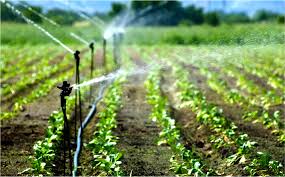
Grekkon Limited supplies and installs various types of irrigation pipes in Kenya. These pipes are of different diameter sizes, lengths, and wall thickness. The larger the pipe diameter, the more volume of water it carries, and the lesser the frictional losses. With a longer pipe, a grower requires less connections between pipes. Wall thickness determines the amount of water pressure a pipe will withstand. The thicker the wall, the greater the water pressure withstood. It is indicated as pressure nominal (PN), with a number. The higher the number the thicker the walls
Types of Irrigation Pipes in Kenya
1. HDPE pipes (High density polyethylene pipes)
They are black in colour and are manufactured as rolls of 100M for these diameter sizes below
16mm, 20mm, 25mm, 32mm, 40mm, 50mm, 63mm, and 90mm.
Larger then 90mm, we supply them as 50M rolls. Grekkon Limited’s HDPE pipes are UV treated for surface application. They have a long lifespan because they are not easily degraded by the sun when exposed.
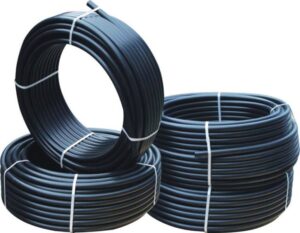
16mm HDPE pipes
HDPE Pipe prices in Kenya
| Size in MM | PN6 | PN8 | PN10 | PN12.5 | PN16 | PN20 | PN25 | Length (M) |
| 16 | 17.00 | 17.00 | 100M | |||||
| 20 | 25 | 28 | 31 | 33 | 36 | 41 | 49 | 100M |
| 25 | 34 | 36 | 40 | 46 | 52 | 64 | 74 | 100M |
| 32 | 49 | 49 | 59 | 71 | 86 | 101 | 120 | 100M |
| 40 | 61 | 76 | 90 | 112 | 132 | 157 | 187 | 100M |
| 50 | 95 | 115 | 139 | 169 | 206 | 243 | 289 | 100M |
| 63 | 151 | 178 | 222 | 269 | 324 | 390 | 454 | 100M |
| 75 | 207 | 255 | 313 | 382 | 453 | 547 | 648 | 100M |
| 90 | 300 | 364 | 450 | 547 | 657 | 789 | 930 | 100M |
| 110 | 441 | 548 | 669 | 810 | 974 | 1,170 | 1,394 | 50M |
| 125 | 568 | 700 | 854 | 1,044 | 1,264 | 1,514 | 1,793 | 50M |
| 140 | 716 | 876 | 1,073 | 1,307 | 1,575 | 1,898 | 2,254 | 50M |
| 160 | 940 | 1,149 | 1,399 | 1,706 | 2,063 | 2,472 | 2,932 | 12M |
| 180 | 1,171 | 1,444 | 1,770 | 2,165 | 2,614 | 3,126 | 3,706 | 12M |
| 200 | 1,451 | 1,789 | 2,183 | 2,655 | 3,223 | 3,866 | 4,584 | 12M |
| 225 | 1,824 | 2,168 | 2,771 | 3,372 | 4,080 | 4,895 | 5,797 | 12M |
| 250 | 2,254 | 2,767 | 3,395 | 4,153 | 5,017 | 6,015 | 7,154 | 12M |
| 280 | 2,819 | 3,492 | 4,265 | 5,205 | 6,291 | 7,560 | 8,972 | 12M |
| 315 | 3,592 | 4,389 | 5,401 | 6,596 | 7,963 | 9,562 | 11,358 | 12M |
| 355 | 4,538 | 5,573 | 6,875 | 8,363 | 10,108 | 12,147 | 14,401 | 12M |
| 400 | 5,755 | 7,106 | 8,688 | 10,605 | 12,833 | 15,408 | 18,288 | 12M |
| 450 | 7,277 | 8,987 | 11,007 | 13,433 | 16,251 | 19,507 | 23,137 | 12M |
| 500 | 8,976 | 11,087 | 13,601 | 16,576 | 20,052 | 24,038 | – | 12M |
| 560 | 11,252 | 13,877 | 17,038 | 20,796 | 25,120 | 30,158 | – | 12M |
| 630 | 14,257 | 17,529 | 21,579 | 26,285 | 31,828 | 38,163 | – | 12M |
2. PVC Pipes (Polyvinyl chloride pipes)
PVC pipes are 6M long, come in different diameter and wall thickness sizes. They have no UV treatment and are thus for sub-surface irrigation application.
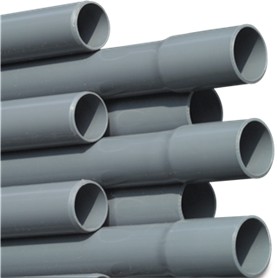
PVC Pipes by Grekkon Limited
PVC Pipe Prices in Kenya
| Size in MM | PN6 | PN8 | PN10 | PN12.5 | PN16 |
| 379 | |||||
| 425 | 532 | ||||
| 32 | 553 | 588 | 694 | 795 | |
| 40 | 698 | 744 | 877 | 1093 | 1220 |
| 50 | 935 | 1,162 | 1,383 | 1705 | 1760 |
| 63 | 1,475 | 1,833 | 2,177 | 2722 | 3359 |
| 75 | 2,024 | 2,529 | 3,111 | 3839 | 4702 |
| 90 | 2,955 | 3,664 | 4,459 | 5527 | 6755 |
| 110 | 3,508 | 4,388 | 5,951 | 6717 | 8260 |
| 140 | 5,782 | 7,060 | 8,795 | 10805 | 13229 |
| 160 | 7,295 | 9,195 | 11,536 | 14189 | 17032 |
| 200 | 11,566 | 14,538 | 17,915 | 22116 | 27086 |
| 225 | 14,610 | 18,210 | 22,521 | 27991 | 34312 |
3. Delivery/ Lay-flat pipes
They are highly flexible irrigation water pipes made from UV treated PVC material.They are supplied as 30M, 50M or 100M long. The diameters are 2″ and 3″, with thicknesses of PN6, PN8 1nd PN10. These pipes are designed for surface use.
In sprinkler irrigation systems, they are connected to a water pump, or a HDPE or PVC pipe main line, then to a water sprinkler. In drip irrigation systems, it will be a main, or sub main line
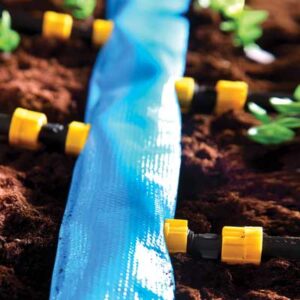
Delivery/ Lay-flat pipe
4. Drip Irrigation Pipes
These are 0.3mm, 0.4mm, and 1mm thick pipes with a 16mm diameter. They are the lateral that deliver water to the base of the crop. The 0.3mm and 0.4mm are for vegetable crops, while the 1mm are for hedges and orchards. They all have pre-perforated emitters spaced at 15cm, 20cm, or 30cm. The choice of emitter spacing depends on the crop type; 15cm for closely spaced crops like onion and garlic, 20cm for moderately spaced crops like tomato, and cabbage. 30cm is for further spaced crops
5. Rain Hose Pipes
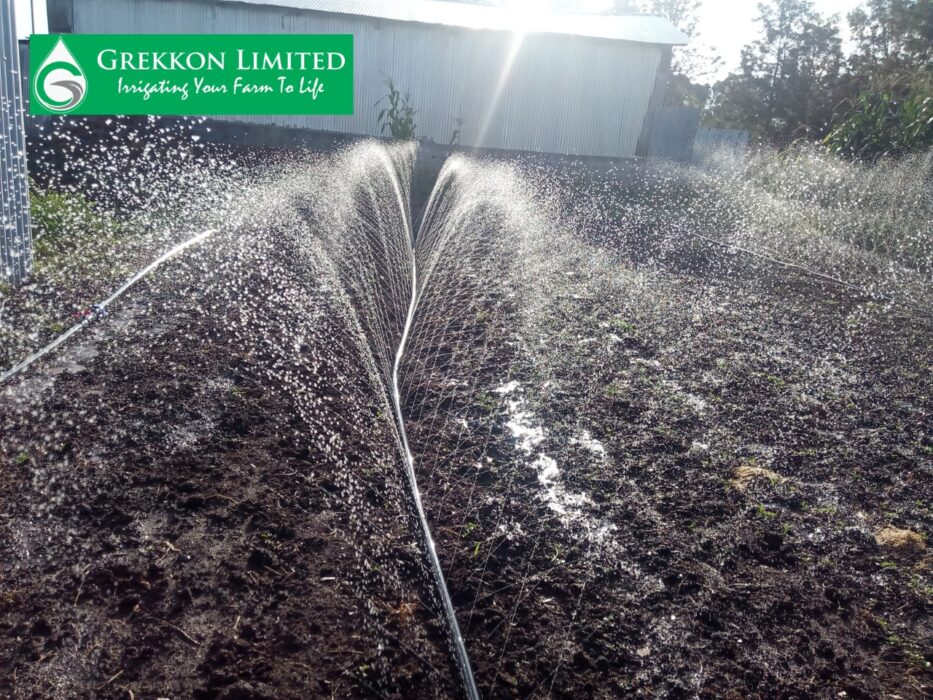
Rain hose irrigation system with nanotechnology punched holes is an affordable irrigation system for overhead irrigation. Rain hose irrigation system uses nano technology to convey water to the plant. It has a series of holes spaced at intervals which sprays water flow by high gravity, or from a water pump is initiated. Our 0.5mm thick, 100M long rain hose pipes are UV treated to last for 10 years in use
Features of a rain hose irrigation system
- It simulates natural rainfall by delivering water to the base of the crop, with the right droplet sizes
- The overhead water is discharged in a 3 dimensional manner; vertically, horizontally, and diagonally
- It is connected directly to a main line
- It is not easily blocked as the water is delivered under high pressure
- The operating pressure is from 15M head / 1.5 bar
Advantages of Grekkon rain hose irrigation pipes
- It is easy to install and maintain, and more economical to install than sprinklers
- It has anti-UV treatment, so it is not easily degraded by the sun
- These spray holes are made with nanotechnology to ensure uniform flow of water
- Irrigate both under gravity flow, and high water pump pressure
- Irrigate an area in just 10 minutes
- Highly portable
- A variety of diameters to select from depending on the farm size
Downsides of a rain hose system
- It is less water efficient compared to drip irrigation
- Water loss due to evaporation
- It cannot be used on crops, for intance, crops that are highly susceptible to fugal infections due to foliage wetness
- It requires high operating pressure
- Rainhose are more prone to clogging than large sprinklers because the have tiny emitters
- Under extremely high pressure, the pipes get damaged
Ideal crops for rain hose irrigation system
Crops that can be irrigated using the grekkon rain hose are:
- Vegetable such as carrots, brassicas, potatoes
- Closely spaced bulbs such as onion and garlic
- Fruit tress; avocado, pixie orange, macadamia, coffee
- Agro forestry
- Lawns, gardens, pasture, and football pitches
They are idea for tree or vegetable nursery irrigation
Types of Irrigation Pipes In Kenya
How to select your irrigation pipe
- Farm ownership method. A leased farm will have the surface HDPE pipes which will be disconnected when the lease period expires. A permanent farm will have sub-surface PVC pipes
- Irrigation method. Drip and rain hose kits will have HDPE and PVC as the main and sub main line often times. Sprinkler systems are best done with delivery pipes due to sprinkler movement in the farm
- Farm size. A larger farm will have larger diameter pipes because more water is needed to irrigate
- Pressure type. Irrigation water flow by gravity is through less thicker pipes such as PN6 or PN8
Related Posts
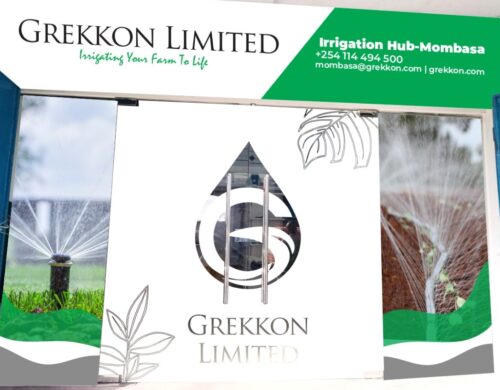
Irrigation Company in Mombasa
In commemoration of our 5 years of serving farmers, Grekkon Limited has a new irrigation company in Mombasa. Grekkon Limited - Irrigation...
